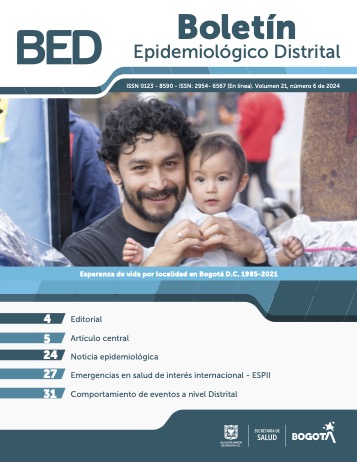Life expectancy by locality in Bogotá D.C. 1985-2021
DOI:
https://doi.org/10.56085/01238590.303Keywords:
life expectancy, life expectancy at bith, mortality, COVID-19, demographicsAbstract
Introduction: Life expectancy (LE) is a relevant indicator for planning health care and social services in a city. Bogotá does not have the development to analyze these indicators by small geographic units - the localities. Objective: To analyze the evolution of LE in Bogotá between 1985-2021, considering the influence of the COVID-19 pandemic on mortality and exploring variations by gender and locality. Methodology: A retrospective study based on official birth and death data for Bogotá. Mortality tables, LE at birth, and survival curves were calculated and deaths were analyzed by age from 1985-2021. Results: LE in Bogotá steadily increased over the years. However, there was a decrease in 2020 and 2021 related to the COVID-19 pandemic. In those year, significant variations in LE were identified by locality and gender. Survival curves improved overall, but there was stagnation or even a decline in older age groups in 2020 and 2021 due to the pandemic. Conclusions: LE is a fundamental indicator for assessing the health and development of a population. The COVID-19 pandemic had a significant impact on mortality in Bogotá, resulting in a reduction in LE. Geographic and gender differences highlight the importance of specific public policies to address inequalities.
Downloads
References
Roubal AM, Pollock EA, Gennuso KP, Blomme CK, Givens ML. Comparative methodologic and practical considerations for life expectancy as a public health mortality measure. Public Health Rep. 11 de marzo de 2021;137(2):255-62. https://doi.org/10.1177/0033354921999407
Woolf SH, Schoomaker H. Life xpectancy and mortality rates in the United States, 1959-2017. JAMA. 26 de noviembre de 2019;322(20):1996. https://doi.org/10.1001/jama.2019.16932
Husain AR. Life expectancy in developing countries: a cross-section analysis. Bangladesh Dev Stud. 2002;28(1/2):161-78.
CENIE. La esperanza de vida: qué es y por qué importa. 2019 [citado 7 de noviembre de 2023]. Disponible en: https://cenie.eu/es/blogs/envejecer-en-sociedad/la-esperanza-de-vida-que-es-y-por-que-importa
Statista Daily Data. Infografía: Aumenta la esperanza de vida en el mundo. 2023 [citado 7 de noviembre de 2023]. Disponible en: https://es.statista.com/grafico/29351/esperanza-de-vida-al-nacer-estimada-por-region
Statista Daily Data. Infografía: La evolución de la esperanza de vida. 2022 [citado 7 de noviembre de 2023]. Disponible en: https://es.statista.com/grafico/28551/esperanza-de-vida-al-nacer-en-el-mundo-y-en-paises-seleccionados-de-1960-a-2020-en-anos
Heuveline, P. Global and national declines in life expectancy: an end-of-2021 assessment. 14 de enero de 2022 [citado 7 de noviembre de 2023]; Disponible en: https://typeset.io/papers/global-and-national-declines-in life-expectancy-an-end-of-fhl6kff8 https://doi.org/10.1101/2022.01.14.22269109
Comisión Económica para América Latina y el Caribe (CEPAL). América Latina y el Caribe: Estimaciones y proyecciones de población. [citado 7 de noviembre de 2023]. Disponible en: https://www.cepal.org/es/subtemas/proyecciones-demograficas/america-latina-caribe-estimaciones-proyecciones-poblacion
Coale AJ, Demeny P, Vaughan B. Uses of the tables 1. En: Coale AJ, Demeny P, Vaughan B, editores. Regional model life tables and stable populations (Second Edition). Academic Press; 1983 [citado 26 de febrerode 2024]. p. 29-38. Disponible en: https://www.sciencedirect.com/science/article/pii/B9780121770808500081 https://doi.org/10.1016/B978-0-12-177080-8.50008-1
United Nations ESCAP GLSB. Model life table. The 1st national capacity building workshop for assessing inequalities in registration; 17 de agosto de 2022 [citado 13 de julio de 2024]. Disponible en: https://www.unescap.org/sites/default/d8files/event-documents/Lecture%203.2.pdf
UNFPA. Model tables: the Coale-Demeny set. [citado 13 de julio de 2024]. Disponible en: http://papp.iussp.org/sessions/papp103_s01/PAPP103_s01_070_010.html
Rau R, Schmertmann CP. District-Level life expectancy in Germany. Dtsch Arzteblatt Int. 20 de julio de 2020;117(29-30):493-9.
Bennett JE, Li G, Foreman K, Best N, Kontis V, Pearson C, et al. The future of life expectancy and life expectancy inequalities in England and Wales: Bayesian spatiotemporal forecasting. Lancet Lond Engl. 11 de julio de 2015;386(9989):163-70. https://doi.org/10.1016/S0140-6736(15)60296-3
Wirayuda AAB, Chan MF. A systematic review of sociodemographic, macroeconomic, and health resources factors on life expectancy. Asia Pac J Public Health. mayo de 2021;33(4):335-56. https://doi.org/10.1177/1010539520983671
Management Association IR, editor. Health economics and healthcare reform: breakthroughs in research and practice. IGI Global; 2018 [citado 25 de julio de2024]. Disponible en: http://services.igiglobal.com/resolvedoi/resolve.aspx?doi=10.4018/978-1-5225-3168-5 https://doi.org/10.4018/978-1-5225-3168-5
Zajacova A, Lawrence EM. The relationship between education and health: reducing disparities through a contextual approach. Annu Rev Public Health. 1 de abril de 2018;39(1):273-89. https://doi.org/10.1146/annurev-publhealth-031816-044628
Jetter M, Laudage S, Stadelmann D. The intimate link between income levels and life expectancy: global evidence from 213 years. Institute of Labor Economics (IZA); 2016 jun [citado 25 de julio de 2024]. Report No. 10015. Disponible en: https://econpapers.repec.org/paper/izaizadps/dp10015.htm https://doi.org/10.2139/ssrn.2803847
González-Pérez GJ, Vega-López MG, Souza ERD, Pinto LW. Mortalidad por violencias y su impacto en la esperanza de vida: una comparación entre México y Brasil. Ciênc Saúde Coletiva. septiembre de 2017;22(9):2797-809. https://doi.org/10.1590/1413-81232017229.12172017
Murray CJL, Ahmad OB, Lopez AD, Salomon J. WHO System of model life tables. GPE Discuss Pap Ser No 8 EIPGPEEBD World Health Organ. 1 de enero de 2001.






